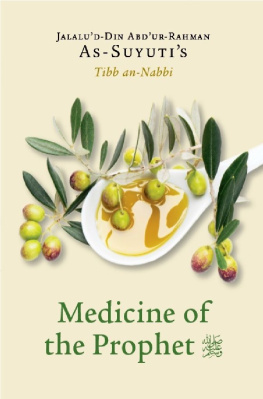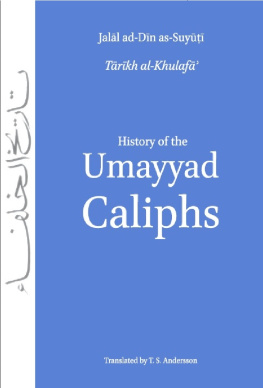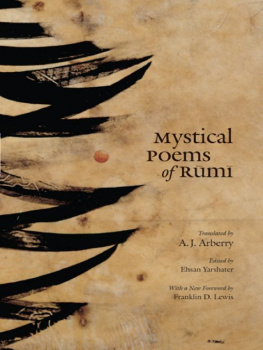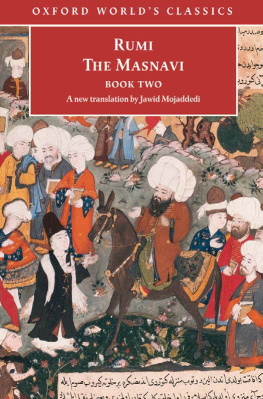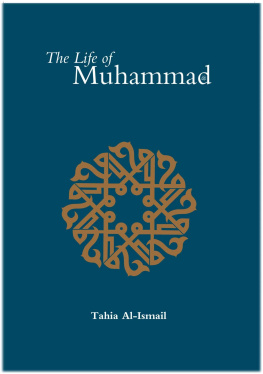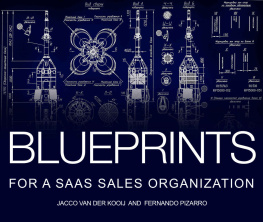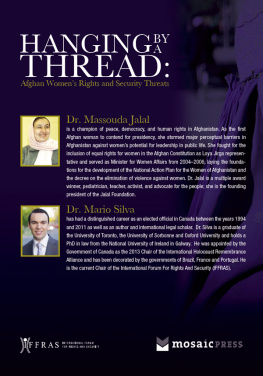Jalal Ad-Din As-Suyuti - Medicine of the Prophet (SAAS): Tibb an-Nabbi
Here you can read online Jalal Ad-Din As-Suyuti - Medicine of the Prophet (SAAS): Tibb an-Nabbi full text of the book (entire story) in english for free. Download pdf and epub, get meaning, cover and reviews about this ebook. year: 2015, publisher: Ta-Ha Publishers Ltd, genre: Science. Description of the work, (preface) as well as reviews are available. Best literature library LitArk.com created for fans of good reading and offers a wide selection of genres:
Romance novel
Science fiction
Adventure
Detective
Science
History
Home and family
Prose
Art
Politics
Computer
Non-fiction
Religion
Business
Children
Humor
Choose a favorite category and find really read worthwhile books. Enjoy immersion in the world of imagination, feel the emotions of the characters or learn something new for yourself, make an fascinating discovery.
- Book:Medicine of the Prophet (SAAS): Tibb an-Nabbi
- Author:
- Publisher:Ta-Ha Publishers Ltd
- Genre:
- Year:2015
- Rating:4 / 5
- Favourites:Add to favourites
- Your mark:
- 80
- 1
- 2
- 3
- 4
- 5
Medicine of the Prophet (SAAS): Tibb an-Nabbi: summary, description and annotation
We offer to read an annotation, description, summary or preface (depends on what the author of the book "Medicine of the Prophet (SAAS): Tibb an-Nabbi" wrote himself). If you haven't found the necessary information about the book — write in the comments, we will try to find it.
Medicine of the Prophet (SAAS): Tibb an-Nabbi — read online for free the complete book (whole text) full work
Below is the text of the book, divided by pages. System saving the place of the last page read, allows you to conveniently read the book "Medicine of the Prophet (SAAS): Tibb an-Nabbi" online for free, without having to search again every time where you left off. Put a bookmark, and you can go to the page where you finished reading at any time.
Font size:
Interval:
Bookmark:
J ALALU D -D IN A BD UR -R AHMAN
A S -S UYUTI S
Tibb an-Nabbi

Medicine of the Prophet 

Ta-Ha Publishers Ltd.
Copyright Ta-Ha Publishers Ltd. Dhul-Hijjah 1414/June 1994
Reprinted: 1996, 1997, 1999, 2004, 2009
Revised Edition 2015
Published by:
Ta-Ha Publishers Ltd.
Unit 4, The Windsor Centre Windsor Grove
West Norwood
London, SE27 9NT
United Kingdom
www.tahapublishers.com
Translated from Tibb an-Nabbi
Jalalud-Din Abdur-Rahman As-Suyuti
Edited by: Ahmad Thomson
Glossaries and Index compiled by: Ahmad Thomson
Cover and Book Design by: Shakir Abdulcadir .: opensquares.uk
A catalogue record of this book is available from the British Library
ISBN 13: 978-1-89794-015-0
Printed and bound by: IMAK Ofset, Turkey

C ONTENTS

A CKNOWLEDGEMENTS
The publishers would like to thank Cyril Elgood, whose translation of As-Suyutis work has been of great help in the preparation of this translation.

A BOUT THE A UTHOR
Jalalud-Din Abdur-Rahman ibn Abi Bakr as-Suyuti, who is generally known simply as As-Suyuti, was born in Asyut in Upper Egypt in 848 AH/1445 CE. His family originally came from Persia and he also had Turkish ancestry. As-Suyuti had memorised the Quran by heart by the age of eight, and became a scholar of the Muslim sciences. During his life he wrote many books on a wide variety of subjects, of which Tibb an-Nabbi was one of the most popular. Indeed it can still be purchased in Arabic today.
There are several other important works concerning the medicine of the Prophet, may Allah bless him and grant him peace, most of which share the same title Tibb an-Nabbi and it is helpful not to confuse them. Perhaps two of the better known of these works are those compiled by Abu Nuaim (died in 430 AH/1038 CE) who was from Persia, and Ibn al-Qayyim al-Jawziyya (died in 751 AH/1350 CE) who was from North Africa.
As-Suyuti, who died at the age of sixty in 911 AH/1505 CE, clearly knew these earlier works well, for he refers to their authors several times in his book, as well as being familiar with more detailed works such as that of Ibn Sina, who was affectionately renamed Avicenna by the Europeans.
It is clear from As-Suyutis writing that his knowledge of medicine was not merely academic, but based on sound practice and experience, and it is equally clear from what he says that the art of medicine and the gift of healing are not merely the result of experimentation and good luck, but rather a divinely revealed science whose results are ultimately and essentially the outcome of the mercy and the decree of Allah:
And when I am sick, then He heals me. (Quran 26:80)

In the Name of Allah the Merciful the Compassionate
A UTHOR S I NTRODUCTION
Praise belongs to Allah Who has given existence to every self, and Who has inspired each one towards right actions and wrong actions, and Who has taught what is good for them and what is harmful for them, what causes sickness and what gives health, and Who has created death and granted new life.
And I bear witness that there is no god except Allah, and that He is One and without a partner. And I bear witness that Muhammad is His Prophet and His slave. He has sent him with mercy for whoever is worthy of mercy, and with punishments for whoever deserves punishment. May the mercy of Allah be on him and his family for ever and ever until the Day of Rising and the Day of Good News.
To continue, it is obligatory on every Muslim to draw as close to Allah the Almighty as he can, and to expend all his energy in paying attention to His commands and being obedient to Him, and to make the best use of the means that he has, and to be successful in drawing near to Him by acting in accordance with what is commanded and avoiding what is forbidden, and to strive for whatever gives benefit to mankind by preserving good health and treating disease for good health is essential in order to fulfil the obligations of the deen and to worship Allah.
Truly I have relied on Allah in my collecting some of the wise sayings of the Prophet, may Allah bless him and grant him peace, which are concerned with medicine. Whatever is required to preserve good health and whatever is inimical to good health, are all to be found here. I seek the help of Allah. My aim is His glory and His acceptance. He is my support, the most excellent of protectors. There is no power and no strength except from Allah, the Beloved, the Wise.
If you find any fault, then correct it, I pray,
for no one is faultless except Allah, you must say.
P ART O NE


T HE T HEORY OF M EDICINE
The Constitution of Man
The constitution of man is made up of seven constituents:
1) The first constituent is the Elements, which are four in number:
Fire, which is hot and dry;
Air, which is hot and wet;
Water, which is cold and wet; and
Earth, which is cold and dry.
2) The second constituent is the Temperaments, which are nine in number:
The first is an evenly balanced temperament;
The second is an unevenly balanced temperament, which may be unmixed, being then hot, cold, wet, or dry;
Or it may be an unevenly balanced but mixed temperament, being hot and dry, or hot and wet, or cold and dry, or cold and wet.
The most evenly balanced of all temperaments in the animal kingdom is the temperament of man. The most evenly balanced of all temperaments in mankind is the temperament of the believer. The most evenly balanced of all temperaments among the believers are the temperaments of the Prophets, peace be on them. The most evenly balanced of temperaments among all the Prophets are the temperaments of the Messengers of Allah, may the blessings and peace of Allah be on them. And the most evenly balanced of temperaments among all the Messengers of Allah is the temperament of those endowed with a resolution to obey Allah. And the most evenly balanced of those so endowed is the temperament of our master Muhammad, may Allah bless him and grant him peace.
I maintain that the reason why Muhammad, may Allah bless him and grant him peace, was the most evenly balanced in character from the point of view of temperament according to the rules of medicine is because the nature of his character was subservient to the temperament of his body and the more perfectly balanced the temperament of the body is, the better is the nature of the character. And He the allKnowing, Glorious and Mighty is He, has borne witness that the Prophet was of an excellent character:
And surely you are on a mighty nature. (Quran 68:4)
Ayesha, may Allah be pleased with her, said, The character of the Prophet, may Allah bless him and grant him peace, is the Quran. Hence it needs must be that his temperament be the most balanced of temperaments. And if his temperament were the most balanced of temperaments, then his character must have been the best of characters.
Next pageFont size:
Interval:
Bookmark:
Similar books «Medicine of the Prophet (SAAS): Tibb an-Nabbi»
Look at similar books to Medicine of the Prophet (SAAS): Tibb an-Nabbi. We have selected literature similar in name and meaning in the hope of providing readers with more options to find new, interesting, not yet read works.
Discussion, reviews of the book Medicine of the Prophet (SAAS): Tibb an-Nabbi and just readers' own opinions. Leave your comments, write what you think about the work, its meaning or the main characters. Specify what exactly you liked and what you didn't like, and why you think so.

